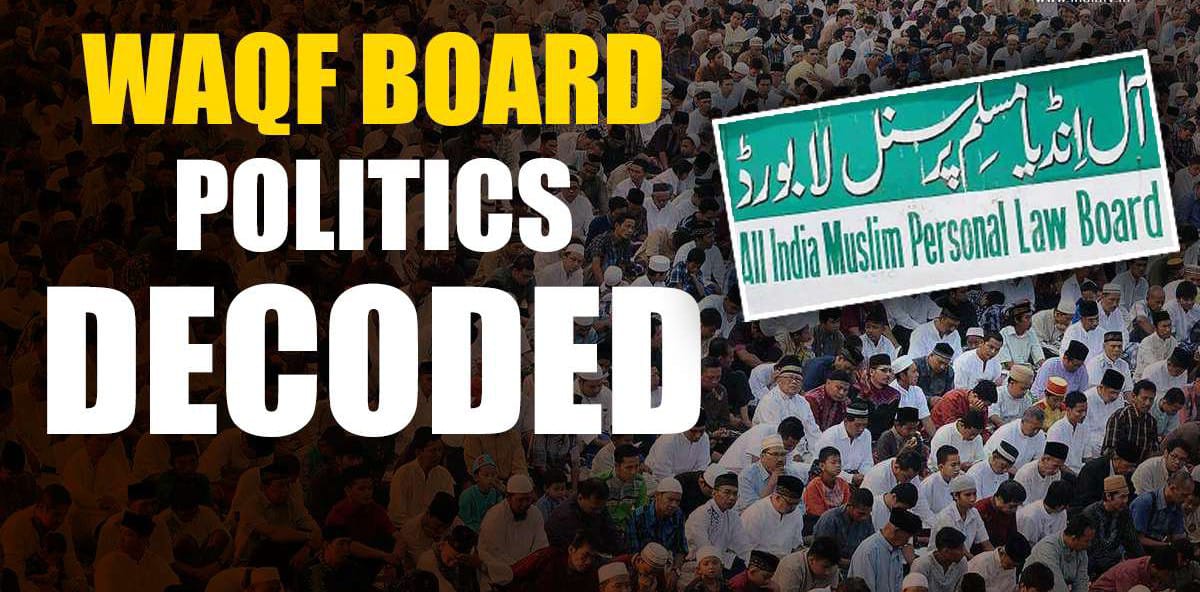Central Waqf Council has no place in a democratic and secular nation like India
Central Waqf Council is an Indian statutory body operated by the Government of India under the Waqf Act, a subsection of the Waqf Act, 1995.
Waqf is a permanent dedication of movable or immovable properties for religious, pious, or charitable purposes as recognized by Muslim Law, given by philanthropists. The grant is known as mushrut-ul-khidmat, while a person making such a dedication is known as Wakif.
India is a secular country as enshrined in the Preamble of our Constitution and prides itself in ensuring that all religions are treated equally under the law. However, the Muslim Waqf Board is an anomaly that stands in stark contradiction to this principle, enjoying exclusive privileges and powers that no other religious body has.
The Waqf Board holds vast amounts of property across the country, with the potential to claim any private land under the pretext of “waqf” (charitable endowment). This often happens without any notice, and properties are taken over without any permission of the actual owners and very often against their will over their rightful land.
There are numerous cases where the Waqf Board has arbitrarily declared land as waqf property such as when the Waqf Board laid claim to hundreds of acres of land in and around the Dargah Hazrat Shah Muntajabuddin in Maharashtra, which belonged to private individuals.
The affected citizens had not donated their land to the waqf, yet their property was taken over without prior notice leaving rightful owners helpless and fighting for justice not from the Constitution of India but from the Islamic Sharia Law.
The existence of the Waqf Board is completely Unconstitutional and Discriminatory and raises critical concerns about the violation of constitutional principles, particularly:
A. Article 14 (Right to Equality): No religious body should be given exclusive powers to control private or public property without following proper legal processes. The Waqf Board, as a government body, is granted rights that other religious groups do not possess.
B. Article 25 (Freedom of Religion): While individuals are free to donate land for religious purposes, no entity should have the power to take over land without the owner’s explicit permission. The Waqf Board’s ability to claim land, often without the knowledge or approval of its owners, undermines this freedom.
There are many real examples of the Muslim Waqf Board abusing its power and claiming public and private property by just declaring it as waqf whenever they wish to do so. In Delhi, the Waqf Board has been involved in numerous legal disputes over properties they arbitrarily claim as waqf land. In several instances, rightful property owners have been forced to fight prolonged court battles (in Sharia Courts) to reclaim their land. In Haryana, Muslim Waqf Board claimed an entire village called Dholagarh as waqf property.
In 2015, the Waqf Board declared that the entire village, including houses, schools, and agricultural land, was part of a waqf endowment. This claim came without any prior notice to the villagers, most of whom had legal documents proving ownership of their land and homes. The villagers, many of whom had lived there for generations, were shocked to learn that they were supposedly living on waqf property. They were forced into a lengthy legal battle, with the Waqf Board asserting its control over the land, claiming it had been part of an endowment for decades.
In 2021, Tamil Nadu Waqf Board claimed nearly 1,500 acres of land, Waqf Board claimed an entire Hindu village called Thiruchendurai. This village is home to the Sri Varadharaja Perumal Temple, a centuries-old Hindu temple. The Waqf Board declared that the village, including residential properties, agricultural land, and the historic temple itself, was waqf property. This claim shocked the local Hindu population, who had been living there for generations and had legal documentation proving their ownership. Despite this, the Waqf Board’s declaration stirred fear and uncertainty among the villagers, as they worried about the future of their homes and the temple.
India is a secular country, but the Muslim Waqf Board is the only religious institution with such far-reaching powers. It can claim land, manage it, and even resolve disputes through Sharia-based courts, which have no place in a democratic and secular nation like India. If a Hindu or a Sikh community wants to manage their religious properties, they have to do so within the strict bounds of the law. Why should the Waqf Board be any different?
I am not opposed to the idea of a Waqf Board that operates within the framework of law and functions as a community body, focused on preserving and utilizing land donated for the welfare of the Muslim community. What I oppose is the Board’s current government-backed status, which grants it disproportionate power over properties without accountability.
What we all should collectively demand is:
1.) Abolishment of the Waqf Board.
2.) An independent audit of all properties under Waqf control to bring justice to the rightful owners and undo all wrongful claims. 3.) Judicial oversight to ensure that all disputes involving Waqf claims are resolved in civil courts, not religious or Sharia-based tribunals.
I feel that existence of such a government body like the Wakf board with such immense, unregulated and absolute power, that too serving only a specific religion and ignoring every other religion, functioning under the guise of religious charity, is unconstitutional, discriminatory, and a threat to the secular fabric of our nation.
I am of the opinion that the Muslim Waqf Board is abusing its absolute power.The existence of Muslim Waqf Board is only leading to Injustice and Religious disharmony. No religion or religious body should have such special powers and authority. Even the existence of Islamic Sharia Tribunal is unconstituional in any secular nation like Bharat.
Article written by and Editorial credit: State Bureau Chief Himanshu Nauriyal.
